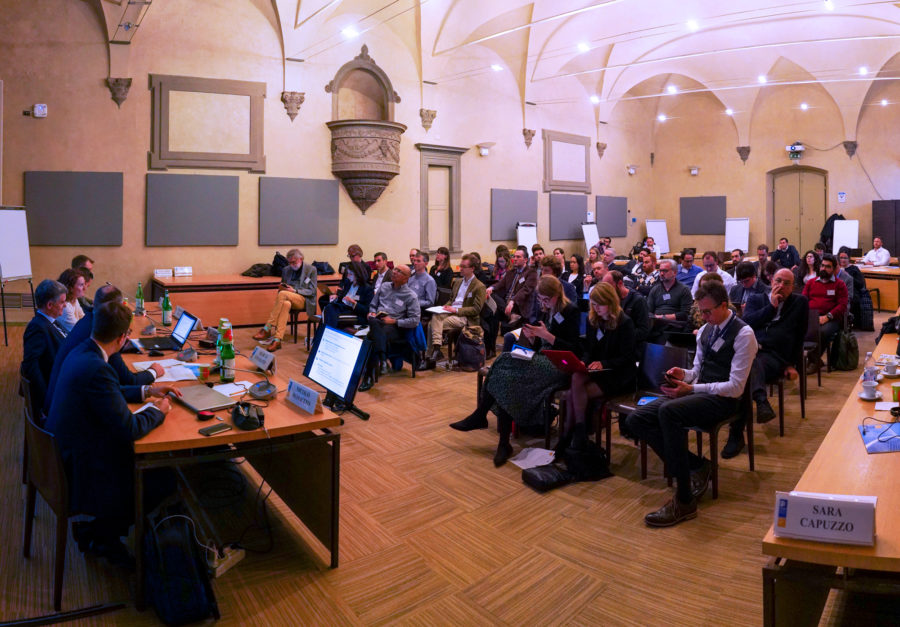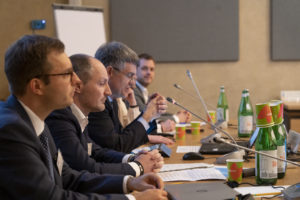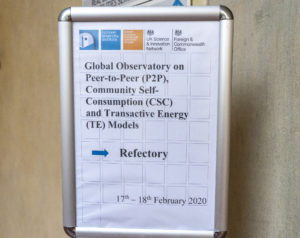31st March 2020 Stockholm, Sweden
Global Observatory on Peer-2-Peer, Community Self-Consumption and Transactive Energy Models

Last month, the FCO’s Science & Innovation Network’s (SIN) in Europe joined forces with the European University Institute – Florence School of Regulation and University College London to host the 2nd meeting of the Global Observatory on Peer-to-Peer, Community Self-Consumption and Transactive Energy Models (GO-P2P). The GO-P2P is part of the Technical Collaboration Programme on Users-Centred Energy Systems by International Energy Agency and consists of 100 experts from academia, industry and non-profits, across 14 countries. The 2nd GO-P2P meeting that took place in beautiful Florence and provided an important forum where GO-P2P members had the opportunity to gain insights into the policy, regulatory, social and technological pre-requisites for the acceleration of these new decentralised energy models.
In the last decade, the global energy system has begun the Schumpeterian process of creative disruption with its institutional framework and infrastructure being challenged and re-shaped. A wide range of drivers from technological to socio-political and environmental have acted in concert to push the energy market over the inflection point where renewables have become the cheapest form of new power generation in many regions around the world. At the same time, the transformation of the electricity system is expected to generate more than $2.4trillion of value over the next ten years according to the World Economic Forum.
As the energy transition continues to unfold in the coming years, the energy system needs to become more flexible. Flexibility is needed in both the generation of energy and its consumption in order to accommodate the rising share of variable and intermittent renewables in the energy mix needed to mitigate climate change. This flexibility will be distributed through increasing numbers of businesses and households producing (e.g. via local photovoltaics) and storing (e.g. via electric vehicles and stationary batteries) their own electricity for self-consumption and/or to help balance the grid, and will drive bi-directional flows of energy on the grid. This is made possible through the digitalisation of the energy sector – allowing optimisation in network and congestion management (including intermittency issues around renewables) and more efficient use of existing infrastructure and assets, but it has also paved the way for digital platforms that are enabling transactive energy markets, self-consuming energy communities and new peer-to-peer business models.

These are some of the main trends that are currently shaping the transformational development of our energy system and are likely to define its future. Transactive energy models have already gained foothold around the world with the rapid proliferation of bi-directional energy transactions among both utility players and prosumer networks, while the locus of energy management, control and asset ownership has already shifted to the local level in many countries providing added flexibility to the system. At the same time, peer-to-peer initiatives that set out to automate-away centralised coordination of energy supply and demand are emerging across various pilot projects, demonstrations and real-market applications around the world.
However, these developments that are underway in the energy sector do not only entail the integration of innovative technologies into the existing system, but in many cases the transformation of the system altogether. Moreover, the institutional and infrastructural complexities involved makes it difficult for the market itself to address policy, regulatory and technology needs. As such, the challenges ahead entails gaining better understanding of how the digital infrastructure will converge with the physical one on a system level and how to re-define the market design and governance structure to ensure an open, adaptable and agile innovation ecosystem that enables business-to-business co-design and interoperability, which can deliver a compelling value proposition for citizens to drive uptake [of new technologies and business models] and change [in the way we produce and consume energy]. This understanding will only be achieved through a close dialogue between the emerging disruptive innovators, early-adopting incumbent businesses and policy-makers and regulators.

In light of this, the FCO-SIN was delighted to have the opportunity to support the event, as GO-P2P provides a unique global platform for knowledge exchange and cooperation that enables innovators and businesses to exchange valuable evidence on factors influencing the uptake of these models and their viability, forge new pre-competitive early-stage research collaboration based on shared interest and complementary expertise and know-how, as well as inform national and international policy-making in an independent, technology-neutral, evidence-based and pre-competitive way that is focused on the collective interest of the energy transition.